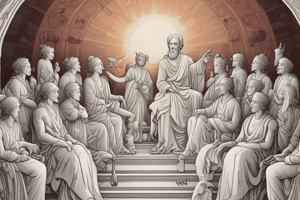Podcast
Questions and Answers
What are the differences between everyday social thinkers and social theorists?
What are the differences between everyday social thinkers and social theorists?
Social theorists theorize in a more disciplined manner, base theories on past knowledge, rely on data, and seek to publish their theories.
What is grand theory?
What is grand theory?
Large effort to explain the story of most, or all, of the world.
Define sociological theory.
Define sociological theory.
Set of interrelated ideas that allow for systematization of knowledge, explanation, and predictions about the social world.
What does the sociological canon consist of?
What does the sociological canon consist of?
What is multicultural social theory?
What is multicultural social theory?
What are theories of everyday life?
What are theories of everyday life?
Define mechanical solidarity.
Define mechanical solidarity.
What is organic solidarity?
What is organic solidarity?
Explain dynamic density.
Explain dynamic density.
What is collective conscience?
What is collective conscience?
Define repressive law.
Define repressive law.
What is restitutive law?
What is restitutive law?
What are social facts?
What are social facts?
Differentiate between material and nonmaterial social facts.
Differentiate between material and nonmaterial social facts.
What is anomie?
What is anomie?
Define anomic suicide.
Define anomic suicide.
What is egoistic suicide?
What is egoistic suicide?
Define altruistic suicide.
Define altruistic suicide.
What is fatalistic suicide?
What is fatalistic suicide?
Define human potential.
Define human potential.
What does alienation entail?
What does alienation entail?
What is capitalism?
What is capitalism?
What are the means of production?
What are the means of production?
Define capitalists.
Define capitalists.
What does proletariat refer to?
What does proletariat refer to?
Define subsistence wage.
Define subsistence wage.
What is the labor theory of value?
What is the labor theory of value?
Define surplus value.
Define surplus value.
What does exploitation refer to in a capitalist context?
What does exploitation refer to in a capitalist context?
What is false consciousness?
What is false consciousness?
Define class consciousness.
Define class consciousness.
What is praxis?
What is praxis?
What is communism?
What is communism?
What does behavior refer to in a sociological context?
What does behavior refer to in a sociological context?
Define action according to Weber.
Define action according to Weber.
What is behaviorism?
What is behaviorism?
Define affectual action.
Define affectual action.
What is traditional action?
What is traditional action?
Define value-rational action.
Define value-rational action.
What is means-end rational action?
What is means-end rational action?
Define practical rationality.
Define practical rationality.
What is theoretical rationality?
What is theoretical rationality?
Define substantive rationality.
Define substantive rationality.
What is formal rationality?
What is formal rationality?
Define Protestant ethic.
Define Protestant ethic.
What does verstehen refer to?
What does verstehen refer to?
Define spirit of capitalism.
Define spirit of capitalism.
What is traditional authority?
What is traditional authority?
Define charismatic authority.
Define charismatic authority.
What does charisma mean?
What does charisma mean?
What is routinization of charisma?
What is routinization of charisma?
Define ideal type.
Define ideal type.
What is bureaucracy?
What is bureaucracy?
Define rational-legal authority.
Define rational-legal authority.
What does association refer to in sociology?
What does association refer to in sociology?
What are forms in sociological terms?
What are forms in sociological terms?
Define types in sociology.
Define types in sociology.
What is secrecy?
What is secrecy?
Define lie in a sociological context.
Define lie in a sociological context.
What does reify mean?
What does reify mean?
What is a dyad?
What is a dyad?
Define triad.
Define triad.
What is a stranger in sociological terms?
What is a stranger in sociological terms?
Define objective culture.
Define objective culture.
What is individual culture?
What is individual culture?
What is the tragedy of culture?
What is the tragedy of culture?
What does act refer to in Mead's theory?
What does act refer to in Mead's theory?
Define impulse in Mead's terms.
Define impulse in Mead's terms.
What is perception in the context of Mead's act?
What is perception in the context of Mead's act?
Define manipulation as per Mead.
Define manipulation as per Mead.
What is consummation?
What is consummation?
What are gestures?
What are gestures?
Define conversation of gestures.
Define conversation of gestures.
What are significant gestures?
What are significant gestures?
Define significant symbols.
Define significant symbols.
What does mind refer to in Mead's theory?
What does mind refer to in Mead's theory?
Define self in the context of Mead's work.
Define self in the context of Mead's work.
What is reflexivity?
What is reflexivity?
Define play stage in Mead's framework.
Define play stage in Mead's framework.
What is the definition of the situation?
What is the definition of the situation?
What is the game stage in Mead's theory?
What is the game stage in Mead's theory?
Define generalized other.
Define generalized other.
What is the 'I' in Mead's theory?
What is the 'I' in Mead's theory?
Define 'me' in the context of Mead's work.
Define 'me' in the context of Mead's work.
What is structural functionalism?
What is structural functionalism?
Define structures in sociology.
Define structures in sociology.
What are functions in structural functionalism?
What are functions in structural functionalism?
What is societal functionalism?
What is societal functionalism?
Define social stratification.
Define social stratification.
What are middle-range theories?
What are middle-range theories?
Define dysfunctions in a sociological context.
Define dysfunctions in a sociological context.
What do nonfunctions refer to?
What do nonfunctions refer to?
Define net balance as per Merton.
Define net balance as per Merton.
What are manifest functions?
What are manifest functions?
Define latent functions.
Define latent functions.
What are unanticipated consequences?
What are unanticipated consequences?
What does anomie (Merton) refer to?
What does anomie (Merton) refer to?
Define debunking.
Define debunking.
What are imperatively coordinated associations?
What are imperatively coordinated associations?
Flashcards are hidden until you start studying
Study Notes
Sociological Theory and Its Foundations
- Everyday social thinkers lack the disciplined approach of social theorists, who rely on empirical data and published theories.
- Grand theories aim to explain large-scale phenomena encompassing most of the world.
- Sociological theory comprises interrelated ideas that systematize knowledge, explain social phenomena, and predict outcomes.
- The sociological canon includes key theorists, their theories, and significant texts vital to the field of sociology.
Types of Sociological Perspectives
- Multicultural social theory highlights the experiences of marginalized groups.
- Theories of everyday life examine mundane activities within social contexts.
Solidarity Concepts (Durkheim)
- Mechanical solidarity exists in primitive societies with minimal division of labor, where members share similarities.
- Organic solidarity arises in modern societies with complex division of labor, requiring interdependence among individuals.
- Dynamic density refers to population size and interaction frequency, prompting shifts from mechanical to organic solidarity.
- Collective conscience signifies shared beliefs within a community.
Legal Frameworks (Durkheim)
- Repressive law is prevalent in mechanically solid societies, with harsh penalties for breaches against collective morals.
- Restitutive law is more common in organically solid societies, focusing on obligation and reparations rather than punishment.
Social Facts (Durkheim)
- Social facts are both external and coercive factors that shape individual behavior, studied through empirical means.
- Material social facts manifest visibly (e.g., buildings), whereas nonmaterial social facts involve norms and values.
Concepts of Anomie and Suicide (Durkheim)
- Anomie reflects a state of normlessness that leaves individuals disoriented in society.
- Different types of suicide are categorized based on social integration: anomic, egoistic, altruistic, and fatalistic suicide.
Marxist Theory Foundations
- Capitalism consists of capitalists exploiting the proletariat, leading to alienation and disparity in labor value.
- Means of production are essential for creating goods, while surplus value indicates profit beyond worker compensation.
- False consciousness misrepresents class relations, while class consciousness arises when workers recognize their exploitation.
Weber's Rationalization and Action Types
- Weber differentiates between behavior (automatic actions) and action (intentional behavior).
- Different forms of actions include affectual (emotion-driven), traditional (habitual), value-rational (value-driven), and means-end rational actions (goal-focused).
- Bureaucracy is characterized by hierarchical structures and formal rules guiding authority.
Authority and Leadership (Weber)
- Traditional authority arises from historical legitimacy, while charismatic authority springs from a leader's extraordinary qualities.
- Rational-legal authority is based on established rules and regulations.
Simmel's Interaction Dynamics
- Simmel explores social interactions through concepts like dyads and triads, emphasizing the significance of relationships and forms of society.
- Secrecy and lies represent forms of intentional concealment within social exchanges.
Mead's Symbolic Interactionism
- Social acts involve a sequence of impulse, perception, manipulation, and consummation aimed at satisfying needs.
- Gestures can be significant or mindless, facilitating complex human interactions.
- The self emerges through stages including play and game, developing the ability to observe and reflect on oneself and others.
Structural Functionalism (Merton)
- Structural functionalism examines social structures and their roles within society, considering both positive and negative consequences.
- Key concepts include manifest functions (intended consequences) and latent functions (unintended positive effects), highlighting the net balance of social phenomena.
Anomie and Social Disconnection (Merton)
- Merton's concept of anomie denotes disconnection between social structures and culture, leading to societal dysfunctions.
- Debunking refers to analyzing real outcomes versus stated intentions.
Authority in Social Associations (Dahrendorf)
- Imperatively coordinated associations are organizations structured hierarchically, governed by authority relations.
Studying That Suits You
Use AI to generate personalized quizzes and flashcards to suit your learning preferences.




